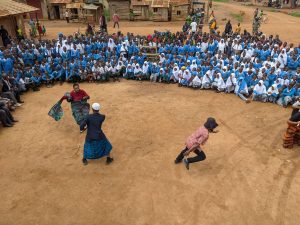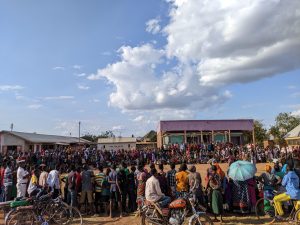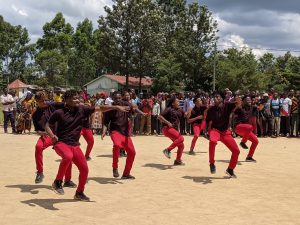Case study : East African Crude Oil Pipeline Community Awareness Campaign
THT deployed teams of talented performers and educators to tour 231 villages across 8 regions of Tanzania. Each performance was carefully crafted to resonate with the local culture, language, and context, ensuring maximum impact. The plays were not only educational but also entertaining, drawing large crowds and fostering a spirit of communal participation.
- Customizing Content for Local Relevance: The theatrical scripts were tailored to reflect the specific challenges and realities faced by each community. This localized approach ensured that the messages were relevant and practical, making it easier for villagers to relate to and act on the information presented.
- Interactive and Participatory Performances: The TIE activities were designed to be highly interactive, with audience members often being invited to participate in the performances. This participatory approach helped to solidify the educational messages and empowered the community members to take ownership of the issues discussed.
- Post-Performance Dialogues: After each performance, THT facilitators engaged the audience in discussions, where they could delve deeper into the themes presented and explore how they could implement the lessons learned in their daily lives. These dialogues were crucial in translating the performances into actionable behavior changes.
Impact and Outcomes
The ground activation through THT’s Theatre in Education had a profound impact on the 231 villages it reached:
- Widespread Community Engagement: The performances attracted large audiences, often including entire villages. The engaging nature of the plays ensured that the key messages were not only heard but also remembered and discussed long after the events.
- Behavioral Shifts: In many of the regions where THT conducted its TIE activities, there was a noticeable shift in community behaviors aligned with the campaign’s objectives. This included increased adoption of health and sanitation practices, greater participation in community initiatives, and a stronger sense of collective responsibility.
- Sustained Dialogue: The post-performance discussions sparked ongoing conversations within the communities, with many villages forming committees or groups to continue addressing the issues highlighted during the performances.
- Expanding Reach to Marginalized Communities: By focusing on rural and underserved areas, THT ensured that crucial educational content reached populations that are often overlooked by mainstream media campaigns, thereby contributing to more equitable access to information and resources.
The success of this ground activation demonstrated the power of Theatre in Education as a tool for social change. THT’s ability to combine artistic talent with educational objectives allowed them to make a lasting impact across diverse communities, reinforcing their role as a leader in innovative, community-driven outreach efforts in Tanzania.




CLIENT:
East African Crude Oil Pipeline Community
